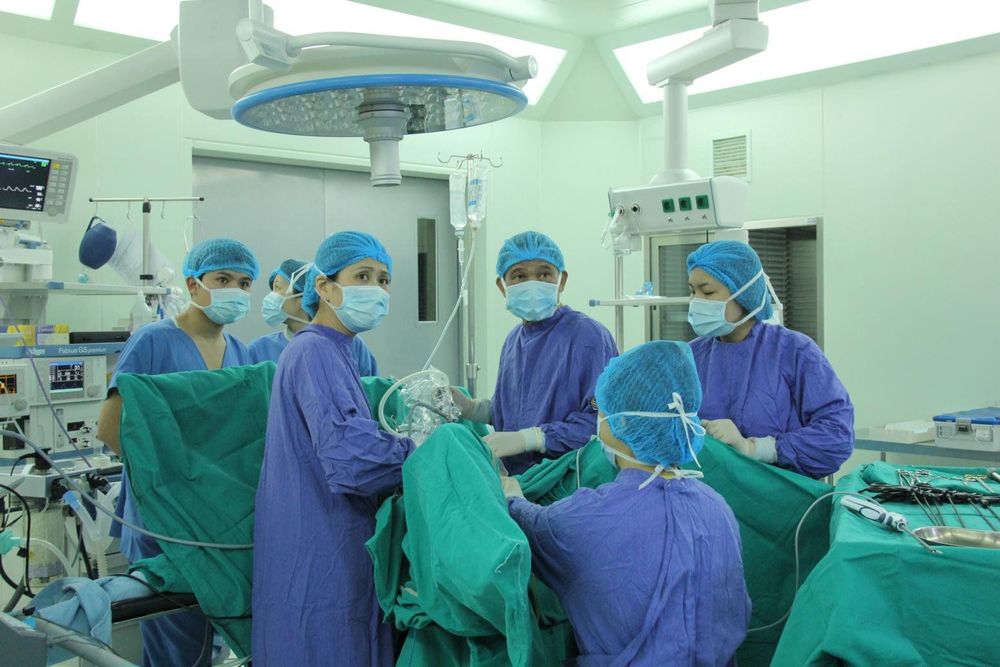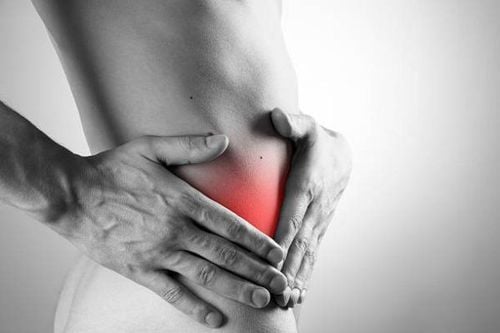This is an automatically translated article.
The article is expertly consulted by a Doctor of Gastrointestinal Endoscopy - Department of Medical Examination & Internal Medicine - Vinmec Da Nang International General Hospital.Laparoscopic surgery brings many benefits to patients, helping to shorten recovery time, reduce pain, improve treatment efficiency, is a strong development step of modern medicine.
1. What is laparoscopic surgery?
Laparoscopic surgery is a surgical technique in which the doctor uses a laparoscope with a camera and light source to see clearly, threaded into the patient's abdomen through a small incision in the skin. The endoscope and supporting devices will help the doctor see all the organs inside the abdomen. After reviewing the situation, determining the treatment direction, the doctor will insert the surgical instruments into the body through the laparoscope or through another small incision in the abdominal wall.Compared with conventional surgery, patients with laparoscopic surgery will have less pain due to very small incision. Thanks to that, the recovery time is also faster, the hospital stay is shortened, the cost is saved, the risk of infection and complications after surgery is also significantly reduced.
2. In which case is laparoscopic surgery indicated?
Laparoscopic surgery is often indicated in the following cases:Cholecystectomy, Gallbladder stone removal, Appendectomy, hysterectomy, ectopic endometriectomy, Partial bowel resection, fibroid removal, Treatment of ectopic pregnancy supply Treatment of ovarian tumors Treatment of female infertility due to polycystic ovaries or fallopian tubes Treatment of urinary incontinence Cancer lymph node dissection Biopsy of intra-abdominal organs.

Phẫu thuật nội soi ổ bụng có thể được chỉ định trong điều trị nhiều bệnh nguy hiểm
3. How long is the hospital stay for laparoscopic surgery?
Laparoscopic surgery takes place very quickly, the patient is also less injured due to the very small incision. Therefore, this surgery may be available on an outpatient basis. Patients can go home on the day of surgery if they recover well after the effects of anesthesia wear off.In case of complicated surgery such as laparoscopic hysterectomy, the patient needs to stay in the hospital for one night to be monitored before he can go home to rest.
4. Laparoscopic surgery procedure
Before the surgery, the patient will be under general anesthesia to sleep and not feel pain during the procedure. In many cases, patients do not need anesthesia, but only need local anesthetic. A regional anesthetic will numb a part of the body, and the patient will be awake and aware for the entire time of surgery.The procedure for laparoscopic surgery is as follows:
The doctor will make a small incision on the navel to insert the laparoscope. The endoscope is fitted with a camera and a light. Through the laparoscope, the doctor can see the entire abdomen and the area to be operated on. During surgery, the doctor will inject carbon dioxide or nitrous oxide into the abdomen to make the view clearer; All images obtained from the endoscope will be transmitted to a screen. The doctor will make a few more small incisions in the abdominal wall to insert surgical instruments into the body. Typically, these incisions will be no more than 1.5 inches long. The doctor can insert a uterine pusher inward to adjust the uterus to different positions to make it easier to see the organs in the abdomen. The doctor will then proceed to remove or treat the predefined problems.

Phẫu thuật nội soi tại Bệnh viện Đa khoa Quốc tế Vinmec
5. How to take care after laparoscopic surgery?
After surgery, the patient will be taken to the recovery room. After the anesthesia wears off, the patient will wake up feeling drowsy. The patient can sleep a few hours later. You may also feel nauseous and tired. If the patient is discharged from the hospital on the same day of surgery, it is necessary to rest for a few hours and have someone drive him home.5.1. Incision care after laparoscopic surgery An incision in the skin is a small wound, which is bandaged by doctors with a breathable, waterproof bandage. After surgery, the patient needs to keep the wound clean and dry to avoid infection. Avoid water for a few days.
5.2. Possible Postoperative Reactions For a few days after surgery, patients may feel tired and uncomfortable. Certainly, at the incision site will feel pain, especially when moving, walking, affecting the wound.
During surgery, the doctor may put a breathing tube in the throat, so after that, the patient may feel a sore throat for a few days. You can hydrate with saline, use lozenges to relieve pain.
In addition, the patient may have back or shoulder pain. This is due to the side effects of the gases used in surgery. This symptom should go away after a few hours or days.
Patients may also have a feeling of abdominal pain and bloating for 1-2 days after surgery. Some types of surgery also cause bleeding or pink discharge in the vagina for 1-2 weeks after surgery.
All of these symptoms are not worrisome and may go away on their own. But if the patient has symptoms that are severe and persist for a long time, it is advisable to see a doctor for advice and examination.
5.3. Mobility after surgery Depending on the different type of surgery, the doctor will tell the patient how long it will take to return to normal activities. With simple surgery, patients can be active after 1-2 days. With complicated surgery, the time to abstain from movement will be longer.
After surgery, patients should note:
Drink water as soon as you wake up Get up and practice walking as soon as possible to avoid intestinal adhesions Try to pass bowels early Can eat normally after having a bowel movement Avoid transport vigorous activity, physical activities in the first 1-2 weeks after surgery Limit sex for 4-6 weeks after surgery.
6. Possible complications after laparoscopic surgery
Any surgery can cause some complications, including laparoscopic surgery. Complications after laparoscopic surgery may include:Hemorrhage in the incision area Hernia in the incision area Incision infection Incisional bleeding Internal bleeding Organ damage Complications from anesthesia. The time of occurrence of each complication is different, in each case it is also different. Complications may not appear immediately, so patients need to listen to their body, when they see unusual signs, they should immediately notify the doctor.
Please dial HOTLINE for more information or register for an appointment HERE. Download MyVinmec app to make appointments faster and to manage your bookings easily.













